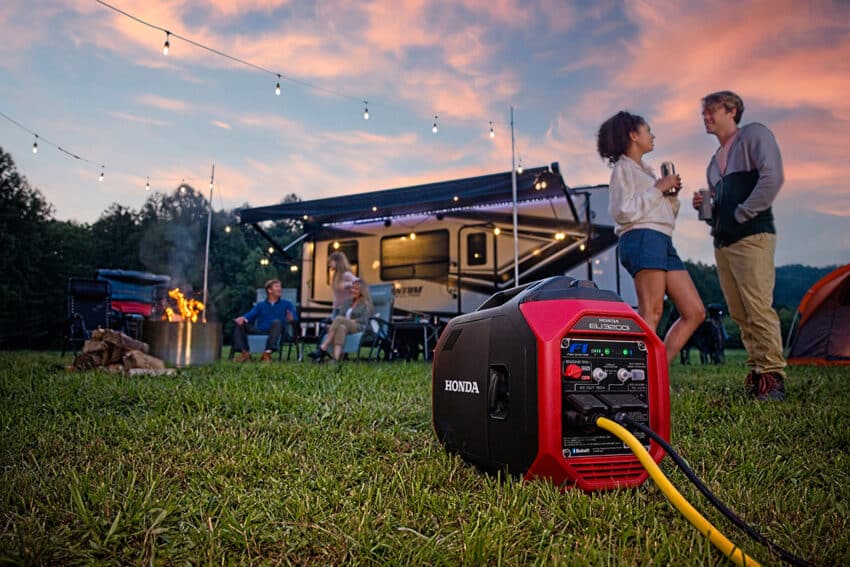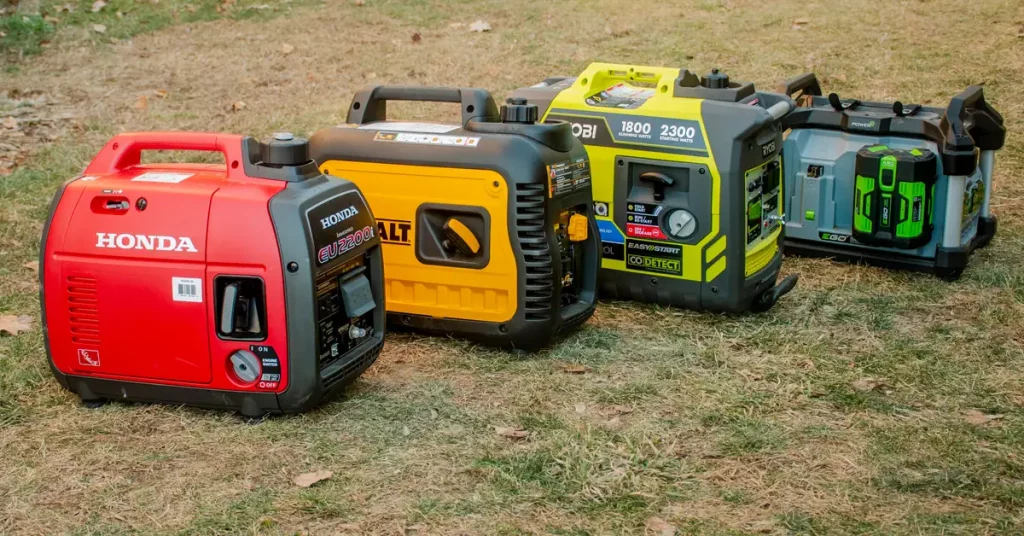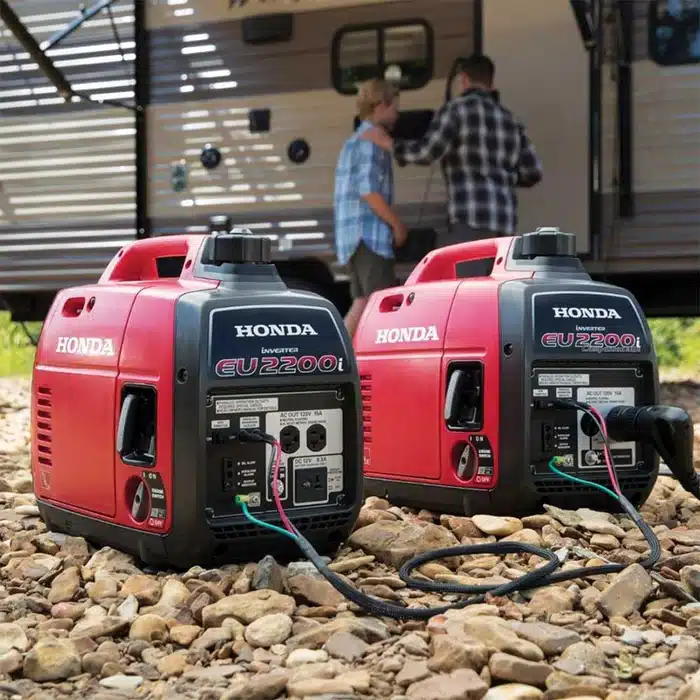Welcome to the world of inverter generators – the silent, small, and powerful machines that are revolutionizing the way we power our lives! The first question that hit our mind before buying a generator is, what type of generator is better for our needs?
We all know the power of a traditional generator, but inverter generators come with some unique advantages that make them the perfect choice for a variety of applications.
From camping to tailgating, from powering your RV to providing backup power for your home, inverter generators can run the above plus some extras!
In this article, we’ll explore the advantage of inverter generators over conventional generators, so let’s get started!
Pros and cons of Inverter Generators Over Conventional Generators
Inverter generators are gaining a lot of popularity lately for many good reasons. When it comes to working in remote areas, an inverter generator is the best option that you can go with. They can even power your whole house! There are several things about them that make them different from standard generators and these differences actually add up to their benefits.
Inverters and inverter generators are electrical devices that transform electric power from direct current (DC) to alternating current (AC).
For example, a common 12 V DC battery inverter is used to convert the 120-volt AC output from batteries into an input of voltage that can be used for household appliances. This type of power converter receives its conversion source from either car or deep-cycle batteries and while they are capable of generating low-wattage outputs, their primary use is often as backup devices rather than full-scale generators.
But what if we need a really high-power generator?
Portable inverter generators are a combination of conventional and battery inverters. They typically produce cleaner power and these types of generators can run small, sensitive electronic devices such as laptops or smartphones in the event that there is an unexpected power outage at home due to natural disasters like hurricanes or earthquakes.
Portable inverter generators combine two types of equipment: electric generator and battery inverter. In case you need backup energy during stormy days for your electronics, this device will be useful because it’s portable so you can have them with ease wherever (household).
The generator, when running on natural gas, can generate AC power with a frequency of 60 Hertz. In order to eliminate the ripples and fluctuations in this type of electricity that plague conventional generators like coal-powered plants or wind turbines; we convert it from DC (direct current) back into clean AC (alternating current).
The first step is the conversion by devices called rectifiers(opens in new tab), which convert high-frequency alternating currents generated by the electric generator at 60 Hz down to direct currents so they will be compatible with our electrical grid.
This process eliminates any ripple effect you would experience otherwise due to being transmitted over long distances through wiring systems not designed for such use cases.
Advantages of Portable Inverter Generators
The inverter generator is pumped into the inverter bank of batteries then from there it distributes current to the inverter which changes the 60 Hz current to 120 V inverter output which is attached to the inverter AC outlet.
Conventional generators are not always the best option due to noise, weight, high fuel consumption, and other disadvantages. In such cases, inverter generators also provide a solution with fewer of these limitations that allow them to be more flexible in their use depending on what is needed.
1. Low Noise Level And Fuel Efficiency

A conventional generator won’t work at the speed you need it to. Conventional generators are designed for a specific voltage, such as 60 Hz or 50 Hz, and will only operate at full power when they’re running near that frequency.
Whatever your unique needs may be in terms of amps drawn, those high-speed gas guzzlers consume fuel with little return on investment by producing more noise than light due to their constant 3600rpm operation rate even if we just want one 100W bulb lit up!
A quality inverter generator can adjust the speed of the engine according to the load, lowering the initial AC frequency. Inverter generators are quiet and recover at 60 Hz regardless and produce 100W for a bulb with only 10 watts of power.
In this way, an inverter is more efficient than a traditional generator as it operates at lower speeds and uses less fuel during operation while still producing similar light output.
Typically, inverter generators are more fuel-efficient in comparison to conventional models. In addition, they produce less noise due to their ability to adjust the output of power according to what is being used at a given time.
2. Smaller Size

Conventional generators are bulky and heavy, making them hard to move. They require a metal frame or wheel mechanism for mobility. This is inconvenient when it comes to their size and weight – unless you’re in the market for a portable generator that can easily fit inside your car, boat, etc!
In contrast with conventional models of generators which have both drawbacks such as bulkiness and downfalls like being difficult to transport due to their heaviness; inverters may be much more compact while still light enough so moving one becomes an easy-peasy thingie without any complicated procedures needing extra help from wheels or other similar contraptions.
3. Parallel Operation

Let’s assume you want to arrange a big party and need a generator of 3000 watts. Your first option is bulky, noisy single-wattage conventional generators that are almost impossible to transport without being an inconvenience for yourself or the people around you at the event.
The second option is an inverter generator, which can be parallel connected to increase the watt rating. For example, two generators with 2000 watts power output, in a single circuit will yield 4000 watts for your needs.
A portable inverter generator may have one advantage over an all-inclusive power station: they are capable of being parallel with other generators. This means that you could connect multiple smaller ones together and create more capacity than anyone individually offer that’s how our model would work as well (connecting 2 x 2kW = 4000 kW).
As opposed to a standard generator, an inverter generator would be significantly lighter in weight and less cumbersome for carrying.
4. Cleaner And Safer Power
Many of our household appliances are becoming smarter and more sophisticated with every passing day. These smart products, from televisions to microwaves, contain a variety of sensitive electronic components that can be damaged by power disruptions such as those caused by conventional generators.
Many modern household items like TVs, microwaves, washers, and dryers rely on electronics in order for them to function properly and these machines often house delicate microprocessors which could easily break if the electricity supply is disrupted or fluctuated while they’re working their magic.
This fascinating process converts the power from DC to AC and back again. The conversion of power involves first inverting it, then converting it through rectifiers which remove any ripples or fluctuations resulting in clean AC power with a low THD.
Disadvantages of Inverter Generators
Inverter generators are not perfect. They require periodic maintenance and adjustments to perform at their best all the time.
Inverter generators are typically more expensive than conventional portable generators, but they have their own perks. Inverters generate lower power outputs in the mid to low thousands of Watts and require less fuel consumption because they can convert what you’re using into electricity.
Inverter generator prices tend to be higher when compared with traditional models due primarily to some interesting benefits that come along with this type of technology – specifically a smaller size and lighter weight for portability purposes as well as efficient use of energy sources (fuel).
Are Inverter Generators Worth It?
Inverter generators are more fuel-efficient and much smaller than conventional generators. They can run just as long on a single tank of gas, but they’re also quieter so you don’t need to worry about disturbing your neighbors with the sound while running it during low-traffic hours or at night when most people sleep.
Can an Inverter Generator Power a House?
Inverters are not typically used for tailgate parties as they can be big and bulky, but if the size is appropriate then you’ll have enough power to keep your party running. These generators generate over 5,000 watts of electricity at 220 volts (overkill for a small gathering).
In order to safely plug an inverter generator into your house’s electrical system, there needs to be some type of safety device called a transfer switch that switches from 120-volts AC household current back up again when it detects more than 3% voltage drop on anyone phase before cutting off power entirely.
Conclusion
If you are looking to reduce the size and weight of your generator, or if you need a quiet running machine that doesn’t pose as much risk for sensitive electronics in case it’s close by, then an inverted generator may be just what you’re looking for. Inverted generators were designed with these factors in mind specifically so they can power equipment more efficiently and quietly than traditional generators while also leaving more room on location because their footprint is smaller.
Although they provide savings in terms of their fuel requirements, the initial cost is higher.
The choice between a conventional generator or an inverter is largely up to the user, but there are key differences that may be considered before making your decision.
If you want high power most of the time and do not intend on using any complicated electronic devices, then a regular generator will work well for you!
If you’re an avid camper but want to keep your neighbors happy, then consider a portable inverter generator. These generators can be much quieter than the gas-powered ones and are more environmentally friendly for backpacking trips too!
If you don’t have any need for excess power on camping or hiking adventures (or just happen to sit next door to someone who’s really noisy), then opting for a quiet hybrid could solve all your problems.
